#uk lawyers
Link
via Twitter https://twitter.com/uklawyer
3 notes
·
View notes
Text
What Is UK Employment Law?
Introduction
The United Kingdom (UK) is known for having one of the most robust employment law frameworks in the world. The UK employment law system comprises a vast body of legislation, regulations, and case law that governs the relationship between employers and employees. This article will provide an overview of UK employment law, including its history, sources, and key features.

History of UK Employment Law:
The UK employment law has its roots in the industrial revolution of the 18th and 19th centuries, which saw the growth of the factory system and the emergence of a large and unregulated workforce. The early labour laws were designed to protect workers from the worst abuses of industrial capitalism, such as long hours, low wages, and dangerous working conditions.
The first significant piece of employment legislation was the Factory Act of 1833, which limited the working hours of women and children in factories. Other landmark laws that followed included the Mines Act of 1842, the Ten Hours Act of 1847, and the Workmen's Compensation Act of 1897. These laws marked the beginning of the modern UK employment law system and laid the groundwork for the creation of the welfare state in the 20th century.
Sources of UK Employment Law:
The UK employment law is derived from a variety of sources, including legislation, regulations, and case law. The primary sources of employment law in the UK are:
Statutes - Acts of Parliament that have been passed by the UK government.
Common law - legal principles that have been established through judicial decisions.
European Union (EU) law - laws that have been enacted by the EU and are binding on all member states.
International law - laws that have been established through treaties and conventions, such as the International Labour Organization (ILO) conventions.
Key Features of UK Employment Law
The UK employment law has several key features that make it one of the most comprehensive and protective in the world. Some of these features include:
Employment contracts - The UK law requires that all employees must have a written employment contract that sets out the terms and conditions of their employment. This includes details about their pay, working hours, holiday entitlement, notice period, and other benefits.
Minimum wage - The UK has a national minimum wage that is set by the government and reviewed annually. The minimum wage varies depending on the age of the worker, with higher rates for those aged 18-21 and over 25.
Working time - The UK law sets limits on the number of hours that employees can work in a week, and the amount of rest breaks they are entitled to. Workers aged 18 and over cannot work more than 48 hours per week, on average, and must have a break of at least 20 minutes if they work for more than six hours.
Discrimination - The UK law prohibits discrimination on the basis of age, disability, gender reassignment, marriage and civil partnership, pregnancy and maternity, race, religion or belief, sex, and sexual orientation. Employers must ensure that they do not discriminate in their recruitment, promotion, or treatment of employees.
Family-friendly policies - The UK law provides for a range of family-friendly policies, including maternity and paternity leave, adoption leave, and flexible working arrangements. Employees are entitled to take up to 52 weeks of maternity leave, and up to two weeks of paternity leave. They can also request flexible working arrangements, such as part-time or job-sharing, to help them balance work and family responsibilities.
Redundancy - The UK law sets out strict procedures that employers must follow when making employees redundant. This includes consulting with employees, offering alternative employment where possible, and paying statutory redundancy pay.
Enforcement of UK Employment Law
The enforcement of UK employment law is the responsibility of several government bodies and agencies, including the Department for Business, Energy and Industrial Strategy (BEIS), the Advisory, Conciliation and Arbitration Service (ACAS), and the Employment Tribunal Service (ETS).
BEIS is responsible for ensuring that employers comply with employment legislation and has the power to investigate and prosecute those who fail to do so. ACAS provides advice and guidance to employers and employees on employment law matters and offers mediation and arbitration services to help resolve workplace disputes. The ETS is an independent judicial body that hears employment disputes and makes legally binding decisions.
Employees who feel that their employment rights have been breached can make a complaint to an employment tribunal. These tribunals have the power to order employers to pay compensation and to reinstate or re-engage employees who have been unfairly dismissed.
Challenges Facing UK Employment Law
While the UK employment law system is one of the most comprehensive and protective in the world, it faces several challenges. Some of these challenges include:
Brexit - The UK's decision to leave the EU has raised questions about the future of EU employment law in the UK. While much of the current EU law has been incorporated into UK law, there is uncertainty about how future EU legislation will be implemented and enforced in the UK.
Gig economy - The rise of the gig economy, where workers are employed on a flexible, short-term basis, has challenged traditional employment law models. Many gig workers are not entitled to the same rights and protections as traditional employees, such as sick pay, holiday pay, and pension contributions.
Technological change - Advances in technology, such as artificial intelligence and automation, are changing the nature of work and raising questions about the future of employment law. For example, there is debate about whether algorithms and automated decision-making should be subject to the same anti-discrimination laws as human decision-making.
Conclusion
The UK employment law system is a complex and comprehensive framework that is designed to protect the rights and interests of employees. It is derived from a variety of sources, including legislation, regulations, and case law, and is enforced by a range of government bodies and agencies. While the system faces several challenges, including Brexit, the gig economy, and technological change, it remains one of the most robust and protective in the world.
1 note
·
View note
Text
Should You Reupholster or Buy New Furniture?
When your favorite couch or cushion inevitably begins to falter, it’s not uncommon to wonder if you should reupholster or buy new furniture.
When your favorite couch or cushion inevitably begins to falter, it’s not uncommon to wonder if you should reupholster or buy new furniture. Both options come with pros and cons, and the best one for your needs depends entirely on your personal situation. Use this guide to determine when it’s time to say goodbye to the old and hello to the new or if your current furniture deserves a second…

View On WordPress
#best upholstery#bungalow#divorce#LAB#marriage#rattan singapore#reupholstery#Reupholstery cost#reupholstery expats#reuphostery singapore#Singapore expats#UK lawyers
0 notes
Text
I've been seeing posts about that last scene between Oliver and Venetia and I definitely think it's a scene worth highlighting more. And yes, she's right for a LOT of it. And yes, it's very interesting that Oliver was openly crying even before he has his Category 5 Hurricane level breakdown at the grave. One of the things I personally find interesting is her scoffing at: you only knew him 6 months. Yes, that's true. And yes, Venetia is drunk and grieving and she lost her brother so comparatively Oliver crying so much would be silly. If I lost one of my brothers and some guy who'd known him six months was having a breakdown I would feel like that person is being ridiculous and that their grief means nothing compared to mine because I knew my brother for a whole life. I understand her perspective very well.
But I also think about things from Oliver's perspective. Of course, Venetia doesn't know that Oliver has (gonna go with has cuz 15+ years later he's still into Felix) these consuming feelings about Felix. She belittles his grief and, by extension, his love. Six months is not a lot of time. But six months is also PLENTY for people who fall in love. And if we include the time he was smitten but didn't actually interact with Felix, Oliver has been actively high on Felix for at least nine months at this point. I say high because that's (in a chemical sense) basically what happens when you're in love or super into someone.
So yeah he killed Felix (and I still think part of him held out for it not working at all). And yeah, he knew him for only six months. But, to him, the grief is seriously intense. All those good chemicals in his brain that were high on Felix are depleted and he's in a state of withdrawal. Is it any wonder he was wearing Felix's aftershave or wearing his clothes? They are tangible ways to feel like Felix is still there. And yes, I know there's also he partially wanted to be Felix thing but that's not what it is here. Smell is powerfully linked to memory. Smelling Felix's aftershave could easily trick his brain into believing Felix is there. Wearing his clothes has him feeling connected. Idk I just find his grieving process interesting as fuck especially given the circumstances and that he's trying to stay at Saltburn no matter what (though, again, I personally view this as going back to Felix).
TL;DR: Venetia is Mother for calling him out. Six months is quite a bit when you're in love with someone so Oliver probably felt belittled when Venetia dismissed his grief.
#saltburn#oliver quick#venetia catton#felix catton#i get his grief but it's still no fucking excuse for facilitating venetia's suicide#like you absolute ass and he would still not go down for murder even if he was found out#my family is full of lawyers and i can tell you that except in elspeth's case#he could not be charged with murder#i mean idk uk law of course#but in the US he definitely wouldn't go down for murder re felix and venetia#in the us it would prob be some form of manslaughter
28 notes
·
View notes
Photo

The Master’s House in Inner Temple with spring blossom
I originally posted this as a daily photograph on AnEveryDayThing but as it is almost the finish of the blossom time of year and I seem to have missed most of it in London , I thought I should re-post here.
124 notes
·
View notes
Text
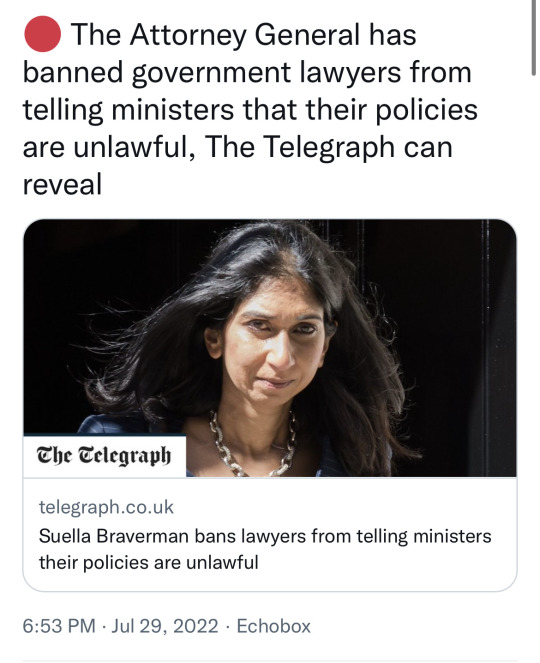
This is not normal in a democracy.
259 notes
·
View notes
Text








WIFEY. | EPISODE TWO (2.3)
start / previous / next
(transcript below)
[eight weeks earlier]
(MELINDA): I know this will have been difficult to hear and I’m more than happy to discuss next steps with you but-
(MAX): Oh fuck this.
door swings open, max stomps down the hallway
(SIMONE): Max!
(MAX): Leave me alone!
(outside the law office)
(SIMONE): Maxie love, you need to come back inside and hear what the solicitor has to say.
(DANIELLE): Mum’s right. You storming out like that makes us look crazy.
(MAX): Get fucked Danielle.
(DANIELLE): kisses her teeth
(MAX): gritted teeth - I’m not gonna sit there and listen to that woman chat shit when I could be finding out the truth instead.
(SIMONE): Max please. We are all hurting, but we need to stick together. Your mum was inside for so long…we don’t know what she was going through. Not really.
(MAX): She had one week left! Why would she throw that away? *small* Why wouldn’t she leave a note?
(SIMONE): Darling I-
(MAX): No!
(MAX): Look, you lot can do what you want, but I’m not letting this go. Someone didn’t want mum released from prison. I’m going to find out who and why. And no one’s gonna stop me.
#in the uk we call lawyers solicitors sometimes#it's an older generation thing - my mum does it#max's fam call them maxie - childhood nickname#simone is max's guardian and mother figure so they're discussing max's bio mum here#em: stories#em: wifey#*wifey#*ep 2#ts4 storytelling#ts4 stories#sims story#sims 4 story#ts4 maxis mix#lgbtq simblr#black simblr#*max kyle#*simone haywood#*danielle haywood#*melinda okafor-chen#tw suicide#tw suicide mention#*part 1
46 notes
·
View notes
Text















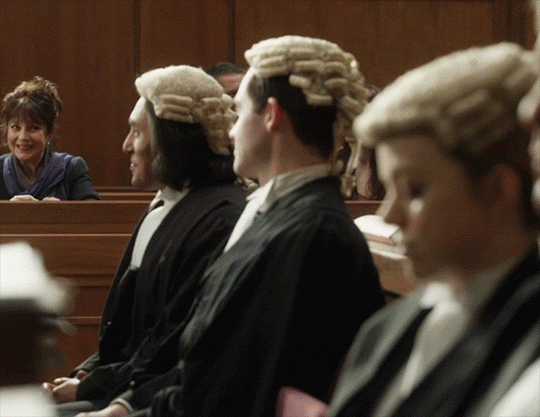
Ramon Tikaram as Vijay Prasad in Law & Order UK, s7 e5
#ramon tikaram#law & order uk#gif#vijay prasad#sexiest lawyer#i made the gifs slower so posting this again ^^#i thought the old ones were too fast for proper enjoyment#i also added some i had excluded last time :o
8 notes
·
View notes
Text
act of 1844
passed in 1844 in britain, this was the first health and safety act passed in britain, according to parliament.uk. the act set working hours to 6 1/2 hours for children working, and made it a crime to have factory machines out in the open. this act was passed during the industrial revolution, when children working in factories was the norm.
#passion project#high school#explore#lawblr#equal rights#usa#lawyer#history#law#discover#uk#england#uk politics#britain#united kingdom#london#industrial#building#children#kids#humanity#parenting#enfants#families#child labor#modern slavery#economics#capitalism#political corruption#wage slavery
7 notes
·
View notes
Link
via Twitter https://twitter.com/uklawyer
2 notes
·
View notes
Text
What is construction law UK? And its types?
Introduction to Construction Law UK
Construction law in the United Kingdom is a specialized legal field that governs the legal rights, responsibilities, and obligations of parties involved in the construction industry. The industry includes contractors, subcontractors, owners, architects, engineers, suppliers, and other professionals involved in the construction process. Construction law covers a wide range of issues, from contract negotiation and administration to dispute resolution, health and safety regulations, and environmental compliance.

Types of Construction Law in the UK
Construction Contract Law: Construction contract law governs the formation, interpretation, and enforcement of contracts between parties involved in construction projects. These contracts can include procurement contracts, design contracts, construction contracts, and professional services agreements. Construction contract law addresses issues such as payment terms, performance obligations, delays and extensions, warranties, and liability.
Planning and Development Law: Planning and development law regulates the process by which land is used and developed. It encompasses a range of issues, including zoning and land use regulations, environmental impact assessments, building regulations, and planning permission. Planning and development law is important in the construction industry because it sets the legal framework for construction projects, including requirements for obtaining permits and complying with building codes and environmental regulations.
Health and Safety Law: Health and safety law governs the legal obligations of employers and employees to maintain a safe and healthy workplace. In the construction industry, health and safety law is particularly important due to the high-risk nature of construction work. Health and safety regulations cover issues such as the use of personal protective equipment, the handling of hazardous materials, and the prevention of accidents and injuries on construction sites.
Environmental Law: Environmental law regulates the impact of construction projects on the natural environment. It covers issues such as air and water pollution, waste management, and the protection of biodiversity. Environmental law is important in the construction industry because construction projects can have significant environmental impacts, both during the construction phase and after the project is completed.
Dispute Resolution Law: Dispute resolution law governs the legal processes by which disputes between parties involved in construction projects are resolved. Disputes can arise from a variety of issues, such as delays, defects, and breaches of contract. Dispute resolution mechanisms can include negotiation, mediation, arbitration, and litigation.
In addition to the types of construction law mentioned above, there are other legal areas that can impact the construction industry in the UK, including:
Insurance Law Insurance: law governs the legal obligations of parties to obtain and maintain insurance coverage for construction projects. Insurance coverage can include professional indemnity insurance, public liability insurance, and employer's liability insurance. Insurance law is important in the construction industry because it can provide financial protection against potential losses and liabilities.
Contract Law: Contract law is the general legal framework that governs the formation, interpretation, and enforcement of contracts in all industries, including construction. While construction contract law is a specialized subset of contract law, general contract law principles still apply in construction projects.
Intellectual Property Law: Intellectual property law governs the legal rights and protections of intellectual property, such as patents, trademarks, and copyrights. In the construction industry, intellectual property law can be relevant to issues such as ownership of design drawings and specifications, protection of proprietary information, and licensing of intellectual property rights.
Employment Law: Employment law regulates the legal rights and obligations of employers and employees in the workplace. In the construction industry, employment law can be relevant to issues such as the classification of workers as employees or independent contractors, compliance with minimum wage laws, and the protection of workers' rights to a safe and healthy workplace.
In summary, construction law in the UK is a multifaceted legal field that covers a wide range of legal issues relevant to the construction industry. Understanding the different types of construction law is important for parties involved in construction projects to ensure compliance with legal requirements, minimize legal risks, and protect their legal rights and interests.
Conclusion:
Construction law in the United Kingdom is a complex and specialized area of law that encompasses a wide range of legal issues relevant to the construction industry. Understanding the different types of construction law is important for parties involved in construction projects to ensure compliance with legal requirements and to protect their legal rights and interests.
1 note
·
View note
Text
A man who asexually abused his daughter began to identify as a woman behind bars and now he will be released after serving less than half his sentence. And he will be released not just with a woman’s name but of the name of a woman well known for defending women’s rights.
A woman who endured years of sexual abuse at the hands of her father has had her pleas to stop his early release from a UK prison denied. Ceri-Lee Galvin, 24, was sexually abused for nine years beginning from the age of eight by Clive Bundy. In 2016, Bundy was sentenced to 15 years in prison for his crimes, which included recording the assaults and sharing them online with other pedophiles.
Disturbingly, it was recently revealed that Bundy had begun identifying as transgender and had adopted the name Claire Fox while in prison. Bundy has now been approved for parole after serving seven years in prison – less than half of his original sentence, and a shorter time than the nine years of abuse Galvin suffered. Bundy will be released as a “woman.”
In March, Member of Parliament for Telford Lucy Allenmentioned Bundy’s case in the House of Commons while calling for convicted sex offenders to be barred from changing their names to evade the law. Allen used the details of Galvin’s ordeal while anonymizing her name as as “Joanna.” But the next month, Galvin revealed herself and issued a statement to the press condemning the decision to evaluate her father for parole under a new identity.
On May 4, Galvin submitted a statement to the parole board responsible for the decision in an attempt to appeal for reconsideration on the grounds that Bundy had not been rehabilitated and as such, the decision was “irrational and unreasonable.”
She decided to contest her father’s release from prison despite herself having been denied legal counsel, which would have been beneficial in lodging her formal objection.
Speaking with Reduxx, Galvin said: “I was told that one of the reasons I could contest his release was if the parole hearing was unlawful. But I don’t know if it was unlawful, because I wasn’t given any representation.”
On May 3, in a desperate effort to keep the public informed on what was happening, Galvin released a statement to social media imploring the parole board re-evaluate their decision to release her father.
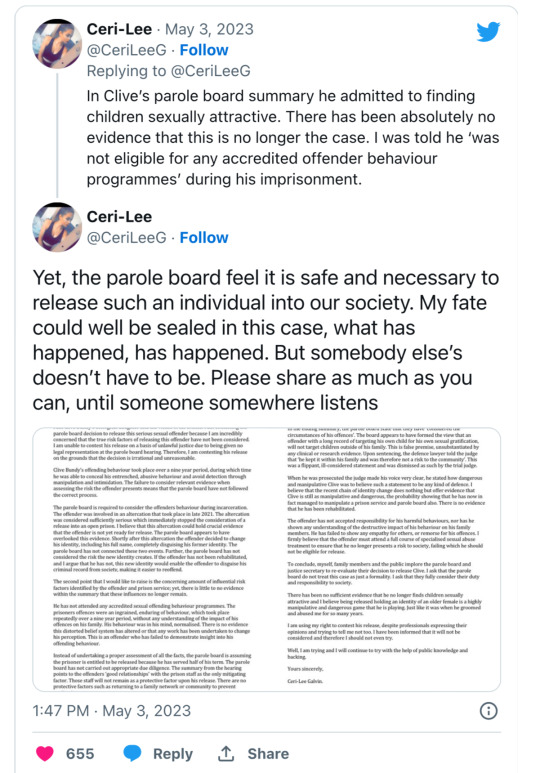
“I am contesting the parole board decision to release this serious sexual offender because I am incredibly concerned that the true risk factors of releasing this offender have not been considered,” she wrote. Galvin pointed out that Bundy had declared his new “identity” in early 2022, following an altercation with another inmate in 2021.
“The altercation was considered sufficiently serious, which immediately stopped the consideration of a release into an open prison. Shortly after this altercation, the offender decided to change his identity, including his full name, completely disguising his former identity. The parole board has not connected these two events,” Galvin asserted.
“Further, the parole board has not considered the risk the new identity creates… This new identity would enable the offender to disguise his criminal record from society, making it easier to reoffend,” she added.
She also emphasized that her father had not been sufficiently rehabilitated and therefore elevates the risk that he may reoffend upon release. Bundy, Galvin says, wasn’t required to attend any accredited sexual offender programs, nor has he.
“How could a man who admits to finding children sexually attractive, and who has absolutely no regard for what the consequences are of abusing children, not be eligible for offender behavior programs, and then be considered for release?” she said.
Galvin further explained that as a result of this, his predatory behavior had become normalized in his mind and he seemed to be without remorse or understanding of the impact his abuse had on his family.
In the parole board’s decision, it was said that the circumstances of Bundy’s offending had been taken into consideration, and the suggestion was made that because he had targeted a family member, he would not pose a threat to other children.
Galvin objected to this assessment: “The board appears to have formed the view that an offender with a long record of targeting his own child for his own sexual gratification will not target children outside of his own family. Upon sentencing, the defense lawyer told the judge that ‘he kept it within his family and therefore was not a risk to the community.’ This was a flippant, ill-considered statement and was dismissed as such by the trial judge.”
But, despite her effort, on May 5, Galvin announced that her father’s release had been granted. Galvin said that she had been warned by her Victim Liaison Officer (VLO) that her objection to her abuser’s release would not be considered.
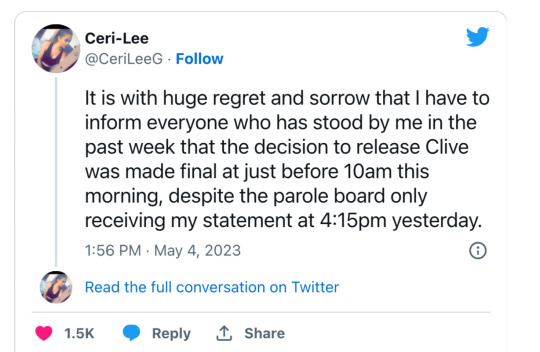
“I submitted at quarter-past four in the afternoon. I received the response just after ten in the morning the next day. In my eyes, that’s not even two working hours that they had considered my statement. That took me so much courage and so much thought to write, and it felt like, ‘Well, we don’t have to look at it, so we’re not going to,'” she told Reduxx.
In a chilling twist, the new identity Bundy has chosen for himself – Claire Fox – is the name of a female politician known for calling attention to safeguarding risks posed by gender identity ideology. Galvin, who describes her father as “manipulative,” does not believe this is a coincidence.
At the beginning of May, after The Daily Mail initially reported on Galvin’s situation and her father’s feminine name was published for the first time, Claire Regina Fox, Baroness Fox of Buckley wrote of how she was astounded to learn that “a convicted pedophile ripped off my name.”
Fox, who is a writer and lecturer, sits in the House of Lords for the Independent Party where she has used her position to oppose gender identity ideology. In an interview with Compact, Fox said she was “outraged” upon hearing that Bundy had taken her name.
“One commentator suggests that sex offenders, specifically pedophiles, select the names of well-known people so that an internet search will only turn up the famous person, and not them. Ceri-Lee suspects that it is no coincidence that he opted for a parliamentarian like me, who has argued that transgender activism endangers free speech and women’s rights. In other words, this is some sort of trolling,” Fox said.
However, Fox emphasized that Galvin was “the real victim” in the situation, and that identity theft can act as a cover for abuse. Due to legal restrictions surrounding names changes conducted on the basis of a gender identity, Galvin was only informed of her father’s new name because he had granted authorities permission to do so. Had he decided to withhold this, she may never have known that he had changed his identification.
Moreover, in an effort to protect her abuser, she was not permitted to know which prison he had been held in during his sentence, despite being a student paramedic who might potentially receive a call to a correctional facility.
Galvin told Reduxx that she is incredulous at the way her rights have been continuously neglected during the ordeal.
“It’s rubbish, because he has served less years than I was abused for, and I am still suffering now. The abuse didn’t stop just because he was arrested. I’m constantly reliving the memories of what he put me through, and trying to build relationships on completely broken trust. It doesn’t end. I’m nearly 25 and still having nightmares.”
She believes that since she has announced his new name to the media, he may choose to alter his identity again – but this time, without informing her. To make matters worse, Bundy will now be granted access to female-only spaces where young girls may be present under vulnerable circumstances due to his gender change.
“I have accepted my fate. The only trouble with me is, I will not be quiet. I will shout. I will do everything that I can to fight for something that I believe in. This doesn’t have to be somebody else’s fate. I want this law changed that allows serious criminals and sex offenders are able to hide behind ‘gender identity.’ I want victims to have equal rights.”
According to recent figures from a Freedom of Information Request submitted by the BBC, over 700 sex offenders have gone “missing” since changing their names through the process of deed poll, which takes approximately 15 minutes to complete, in the period between 2019 – 2021.
One lawmaker responsible for streamlining the system to ensure that trans-identifying individuals are not “outed” to the public is a man who himself identifies as a woman. Judge Victoria McCloud is Britain’s most senior public figure to have claimed a transgender identity and has been celebrated as a pioneer by LGBT campaigners.
By Genevieve Gluck
Genevieve is the Co-Founder of Reduxx, and the outlet's Chief Investigative Journalist with a focused interest in pornography, sexual predators, and fetish subcultures. She is the creator of the podcast Women's Voices, which features news commentary and interviews regarding women's rights.
#UK#claire Fox is Clive Bundy#He’s only began calling himself a woman since 2022?#He would be released with a completely different name#A lawyer actually said that since he only targeted children in his family the community was safe#TIM rips off name of a woman he knows wouldn’t like it#700 sex offenders have gone missing in the UK since they changed their names
28 notes
·
View notes
Text

The arch on Crown Office Row separating Middle Temple and Inner Temple in the Inns of Court
#London#Inns of Court#Inner Temple#Middle Temple#temple#arch#law#legal#barristers#lawyers#crown office row#tradition#England#UK
58 notes
·
View notes
Text
more aziracrow hcs






#the pronouns are random bcos these r almost always written while im walking my dog and smoking a spliff so dont read too deep into it#i know theyre beings with no birthday technically and existed before planets#but this is just something i feel in my bones#also idk anything abt the criminal justice system in the uk but i think human!aziraphales would be one of those lawyers who reps like#tennant unions#crowley#good omens#good omens 2#aziraphale#go hcs#lmao **tenant#worms for brains
13 notes
·
View notes
Text
So they finally published the Illegal Migration Bill
And surprise surprise Braverman is unable to say if it’s compatible with the Human Rights Act
But they still want to proceed with it
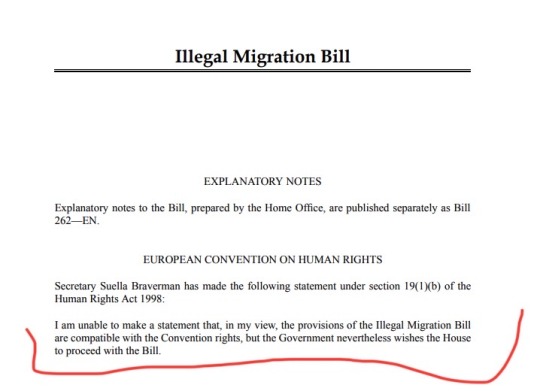
#british politics#uk politics#uk#tories#suella braverman#genuinely sickening#and once again we’ll have this unhinged conversation#“and we would have gotten away with it if it weren’t for you lefty human rights lawyers
23 notes
·
View notes
Text
KJ Charles, absolutely nobody was going around calling Black and brown people "people of colour" in the 1800s. They were called and called themselves "coloured people". It's relevant that the only terminology they had was subtly Othering and coined by whites. Nobody is going to go into vapours if 19th century characters use it. Stop jolting me out of your otherwise very good stories with self-conscious rummage for modern PC terms.
Also for the love of God just say "black" instead of pussy-footing around going "dark skinned". I can't tell who's Indian, Black or Portuguese with this shit. It's a racial and political identity, not a dirty word.
#white people are just#sigh#can y'all be normal for five minutes#afaik both indians and africans used to be called 'black' in the UK#indian ocean slavery was relatively lower key but outlasted atlantic ocean slavery for decades#Ghandi was a lawyer and was forced to ride on the train roof instead of being allowed to share a train car with colonials in his own country#whites didnt give a shit whether or not queen victoria had the offspring of sellout indian royalty as godchildren#all coloured colonized people were savages to them#they barely treated white jews poles and mediterranean europeans as real people let alone asians and africans and aboriginals#racism#british history#historical fiction#queer historical fiction#kj charles#knee of huss
5 notes
·
View notes